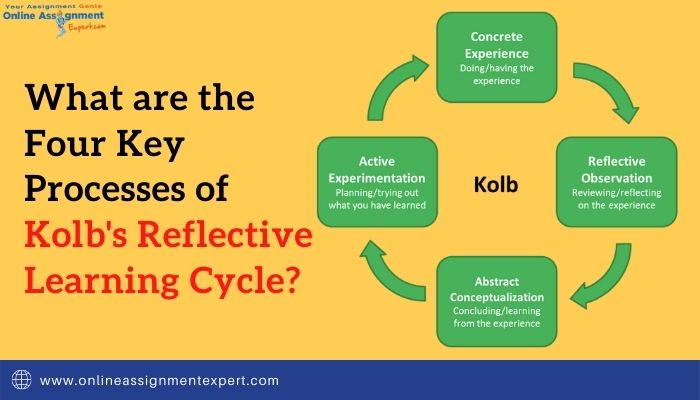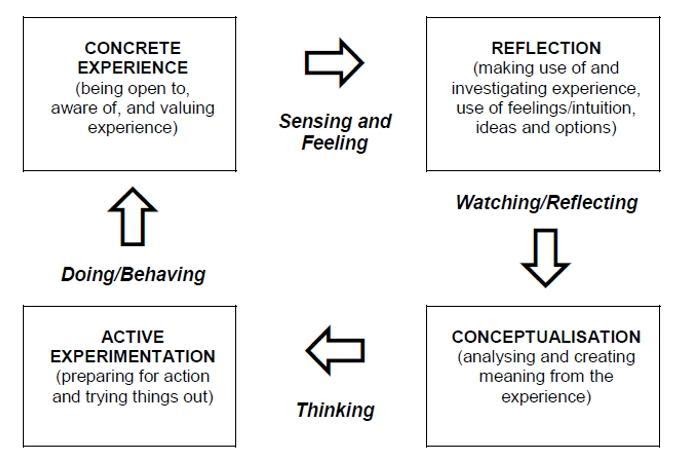Hi Scholars! Are you speculating on Kolb’s reflective model? Here is what it is in a gist.
Kolb’s reflective model is referential learning, also referred to as ‘experiential learning’ that is based on our experience of an event. Only here scholars; the experience is reviewed, analysed and evaluated as research feedback that begins the second cycle for learning.
It is necessary to have a reflective practice in learning to facilitate genuine learning and development.
The concept propagated way back by political thinkers and historians like Confucius, who emphasised the power of reflective practice for enhancing the human condition. He wrote at length on it; way back in 460BC. Kolb’s reflective model for learning provided more space and better learning methods for modern-day times that could help e-learning and development processes.
Kolb’s reflective model argues that humans can reflect on our experiences that facilitate learning and development actively. His model and analysis are used extensively for nursing studies in modern times. The groundwork or Kolb’s reflective model, the basis for this model is our experience. The experience gained here is then:
– Reviewed
– Analysed
– Evaluated
And when the process completes, the new experiences form the starting point for another cycle. To put it in simple words, when you take up the research for a subject, you review the issue, you analyse the subject and eventually evaluate the matter.
Having completed the cycle, the evaluation that has been inferred from your research or learning paves the way for more knowledge, either for another individual or yourself, in case the scholar intends to go for more advanced learning on the subject. Learning is a continuous process that does not end at a point.
The model has four learning styles:
Kolb’s reflective model completes four learning styles. It is based on the theories applied to how people can understand. The concept centres on the concept of developing an understanding of those things while studying, which are otherwise not comprehensible using experience.
In 1984, David Kolb analysed his learning model, comprising of basically four stages, namely:
– Concrete learning
– Reflective observation
– Abstract conceptualization
– Active experimentation.
The four stages of learning can be used for any subject. The process of learning is termed as ‘effective learning’ only when the learner progresses through the cycle.
Diagram: For Kolb’s model of learning
On a comparative scale of two thinkers in reflective learning — John and Kolb, Kolb’s model of reflective learning, when compared to John’s model of reflection, was found more productive.
John suggested that when you reflect, you look inwards, considering your thoughts and feelings. And on looking outwards actual incidents or situations are also considered, considering points like whether the condition was ethical, did external factors affect learning etc.
While Kolb’s reflective model had four major concepts summarised, of which the diagram above conveys most of the process involved in reflective learning.
In Kolb’s reflective learning (1984), the four stages in Kolb’s learning are interrelated in a clockwise pattern, where each step feeds into the next.
Kolb’s, therefore, calls learning a multi-stage and somewhat predictable process. When a scholar writes an assignment on the reflective model, he must summarise learning using the reflective model, writing their response in each of the four stages.
The four learning styles in reflective theory:
The acronym or the short form ‘VARK’ is used for describing four modalities of a student’s learning process (1992 study, by Neil D. Fleming and Coleen E. Mills).
These different learning styles is ‘VARK’ in brief are—
– Visual
– Auditory
– Reading/writing
– Kinesthetic
The four together were identified after hours of research on reflective theory and observation.
What is Kolb’s reflection model?
Kolb’s view of learning is mostly based on being experimental as well as self-driven and cannot be forced from outside. Kolb’s summarised learning is a process where knowledge is generated through the transformation of experience, which can be reflected in facilitating learning and development. Kolb’s model assumed four stages to the experiential learning cycle, and they are:
Concrete experience:
Where you consciously and physically experience a situation, which causes you to realise that you have to reflect systematically to find out something new or improve on your existing skill and practice.
At this stage, a note is made of the particular situation and described on what you see, how you are feeling and what you think, this all together accounts for:
Reflective observation:
Having written down the outline of the experience, it’s now time to reflect more deeply on what went on into this situation. The questions asked in this section are:
– What worked?
– What failed?
– Why did things arise?
An answer to these questions is reflected in this section.
Abstract conceptualisation:
The guiding question for this stage leads on from the problems within the reflective observation stage: Questions here address:
– What could I have got done better or differently?
– How am I capable of improving?
Initially, you are attempting to search out other ways of handling the situations and hatch strategies for once experience in an analogous situation again. Also, this can be the stage where you ought to consult colleagues and literature to urge a stronger understanding and other ideas.
Active experimentation:
The theoretical knowledge forms part of this section. When the learners reflections and thoughts about improvement and likewise are used as theories into your practice and check the new strategies, a number of them work, and some don’t. Then this automatically becomes the premises for the news cycle, as the experiences within the active experimentation stage become the new ‘concrete experiences’ and then the process continues likewise.
To Conclude:
Reflective model of Kolb’s learning is a common practice in the healthcare profession, especially nursing. Kolb’s model does not apply to the Midwifery Council (NMC), but many nursing programmes use Kolb’s theory as a method for reflection. Therefore, it is considered an essential part of nursing studies.
Healthcare practitioners have an ethical responsibility, and Kolb’s reflective practice helps to foster improvements in practice and healthcare services. And the model has proved to be highly effective and an influential theory in nursing.
The model is suggested as good because it emphasises on slow, thoughtful and precise reflection. The individualistic focus empowers users to feel confident in their ability to ‘manage’ their development. In case you, scholar, are a nursing student, it’s time you give full weightage to the importance of reflective models in Kolb’s reflective learning especially.
Author Bio: Koby Mahon is the content writer of this piece. Koby is an active caregiver. During the pandemic, Koby provided extensive support to most COVID-19 patients. Koby is also an active health blogger currently attached to the Online Assignment Expert; he provides assignment help, specifically, nursing assignment help, to scholars connected to the service provider here.

